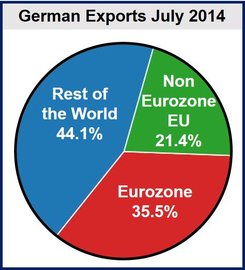Does a German record trade surplus in July mean that Europe’s largest economy is poised for a rebound after shrinking in the second quarter? According to Destatis, the Federal Statistical Office, German exports rose by 8.5% to €101 billion (a new record) and imports increased by 1% to €77.6 billion in July, which translates into a trade surplus of €22.2 billion, a new all-time record.
Coming soon after July data showing a surge in factory output and orders, the trade figures suggest that German GDP will likely avoid a technical recession in Q3, after contracting by -0.2% in the second quarter.
Falling exports to Russia, which declined by -15.5% in the first half of this year, were more than offset by strong demand from the United Kingdom and United States.
The German economy relies more on exports than most other countries for growth and employment. Exports performed relatively poorly in 2013 and declined in three of the first seven months of 2014.
According to provisional data from the Deutsche Bundesbank, Germany’s current account of the balance of payments showed a €21.7 billion surplus, which takes into account balances of trade in goods including:
- Services: (minus) €-5.9 billion,
- Primary income: €+5.9 billion,
- Secondary income: (minus) €-3 billion.
Exports by region
In July, Germany exported €56.9 billion and imported €50.4 billion to/from the European Union, representing an increase of 9.6% and 2.6% in exports and imports respectively compared to July 2013.
Exports and imports with the Eurozone totaled €35.5 billion and €34.7 billion respectively in July, while with non-Eurozone-EU countries Germany exported €21.4 billion and imported €15.7 billion in goods and services.
Exports to the rest of the world (non-EU countries) amounted to €44.1 billion and imports €27.2 billion in July.
In November, 2013, the European Commission said it was to investigate whether the German trade surplus might undermine Europe’s economic recovery. In October last year the US Treasury said the German economic model harms other countries’ economies.
China’s exports surged in August, but imports were down.
German labor costs
Destatis also reported that labor costs per hour worked increased by 1.7% in Q2 2014 compared to Q2 2013, and by 0.7% on Q1 2014.
Labor costs comprise gross earnings and non-wage costs.
The costs of gross earnings, in calendar-adjusted terms, increased by 1.6% in Q2 2014 compared to the same quarter a year earlier, while non-wage costs rose by 2.3%.
The price of one hour worked increased by 0.5% in Germany and 1.2% in the European Union in Q2 2014, compared to Q2 2013.


